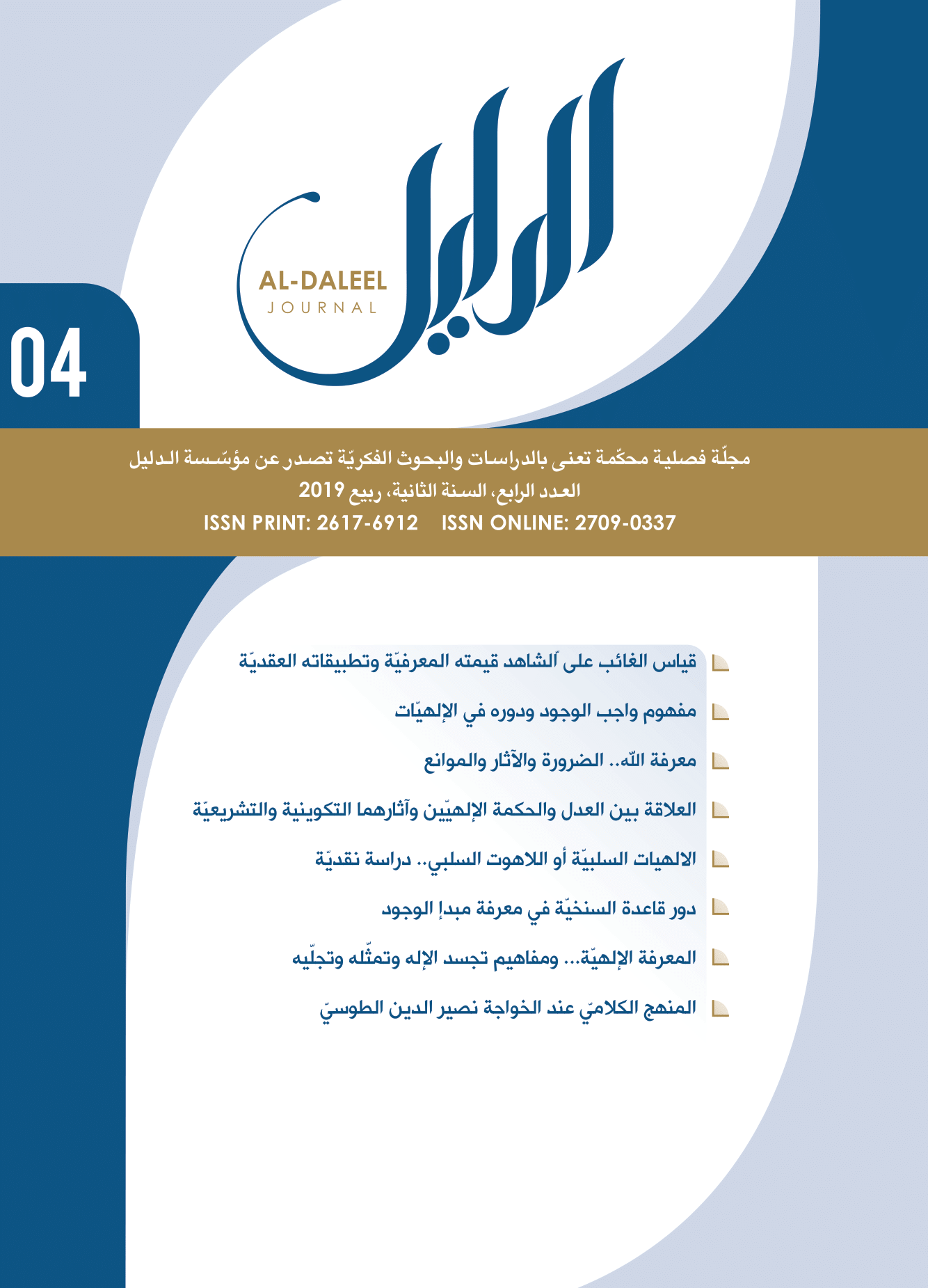Abstract
There are several ways and arguments to know God and know His attributes and actions. One of these ways, which many theologians rely on, is analogizing the absent on the present one, that is called “jurisprudential analogy” or the analogy of representation in logic. There is no doubt that this analogy, according to intellectual standards of proper thinking, does not bring certainty; because it is an applying of a partial judgment, that is the present one, to another partial judgment, that is the absent one, because there is similarity and common things between them. Logicians prove the judgment as comprehensive one time through correlational inference of the opposite (tard al-‘aks), and another time by “probing and division (sabr and taqsim)” and both of which do not lead to certainty. However, some Ash’arite and Mu’tazilite theologians, some traditionists (scholars of Hadith) and others have depended on the \\\\\\\\"analogy of the absent to the present\\\\\\\\" to prove the existence of the Creator and His attributes. In this study, we try to analyze the aspects of this analogy and compare it to the analogy of representation, and then, we discuss the significance of the analogy of the absent to the present one for the Ash’arites, the Mu’tazilites, and the Salafists. After that, we refer to the school of the Ahl al-Bayt (peace be on them) and their followers. At the end, we discuss and criticize the cognitive value of the analogy of the absent to the present and its role in the knowing of Almighty Allah and His attributes and actions, in order to know the extent of authority and validity.
Keywords
analogy of representation
assumption
certainty
the analogy of the absent to the present
the knowing of Almighty Allah
Abstract
هناك طرقٌ وأدلّة متعدّدةٌ لمعرفة الله وصفاته وأفعاله، من جملة هٰذه الطرق الّتي اعتمد عليها كثيرٌ من المتكلّمين «قياس الغائب على الشاهد»، وهو المسمّى بالقياس الفقهيّ أو قياس التمثيل في علم المنطق. ولا شكّ أنّ هٰذا القياس حسب المعايير العقليّة للتفكير الصحيح لا ينتج اليقين، وأنّه لا يغني من الحقّ شيئًا؛ لأنّه إسراء حكمٍ جزئيٍّ هو الشاهد إلى جزئيٍّ آخر هو الغائب، بسبب وجود المشابهة والجامع بينهما. يُثبت أهل المنطق تعليلَ الحكم بالجامع تارةً عن طريق الطرد والعكس، وتارةً عن طريق السبر والتقسيم، وكلا الطريقين لا يفيدان اليقين. ولٰكن اعتمد بعض المتكلّمين من الأشاعرة والمعتزلة وأهل الحديث وغيرهم على «قياس الغائب على الشاهد» في إثبات الصانع - تعالى - وصفاته، من العلم والقدرة والإرادة والقضاء والقدر وغيرها. ونحن في هٰذا البحث نقوم بتحليل خصائص هٰذا القياس وسماته، ونقارنه بقياس التمثيل، ثمّ نتطرّق إلى مكانة قياس الغائب على الشاهد عند الأشاعرة والمعتزلة والسلفيّة، ثمّ نشير إلى نظريّة مدرسة أهل البيت عليهم السلام وأتباعهم، ونشير إلى القرآن الكريم حول قياس الغائب على الشاهد، وفي الأخير ندرس القيمة المعرفيّة لقياس الغائب على الشاهد، ودوره في معرفة الله عز وجل وصفاته وأفعاله، ونجعله في ميزان النقد؛ لنتعرّف على مدى حجيّته واعتباره.
Keywords
الظنّ
اليقين
قياس التمثيل
قياس الغائب على الشاهد
معرفة الله تعالى
